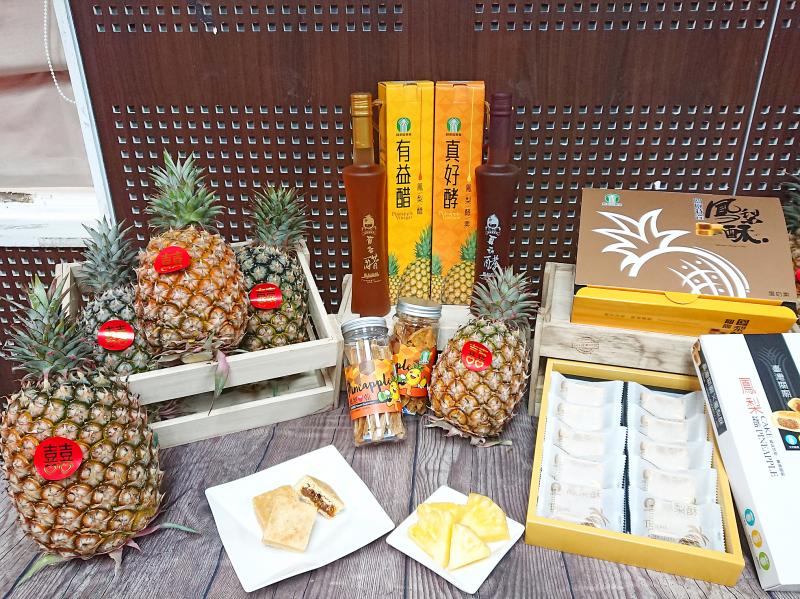Taiwanese firms responded swiftly to a call to buy the nation’s surplus pineapple crop after China abruptly stopped imports, with 10 local firms placing orders totaling 1,600 tonnes, Council of Agriculture officials said yesterday.
China on Friday announced that it would suspend pineapple imports from Taiwan starting tomorrow, saying that various types of mealybugs were found in several batches of fresh pineapples bought from the nation last year.
Taiwanese farmers expressed anger and disappointment over the decision.

Photo: Hung Jui-chin, Taipei Times
The council said it had dealt with the pests after China notified it of their discovery in 13 batches of pineapples sent between March and May last year.
It had not received reports of the pests since new measures took effect on Oct. 19, it said.
Excluding the 13 batches, 99.79 percent of the pineapples sent to China since last year have met Chinese import standards, it added.
Following China’s import ban, government officials called on Taiwanese to support the nation’s pineapple farmers, who are preparing for the harvest season.
The council has set up a hotline for companies to place large orders, and it took measures to stabilize pineapple prices.
Taiwan’s annual pineapple production has averaged about 420,000 tonnes over the past few years, of which nearly 50,000 tonnes were exported to China, government data showed.
Taiwan last year exported 41,661 tonnes of pineapples to China for NT$1.49 billion (US$52.64 million), accounting for 91 percent of total pineapple exports, the data showed.
“We are looking at companies to place orders to present pineapples as gifts to employees and customers. We have already received orders for 1,600 tonnes in one day, which is close to 10 percent of our target of 20,000 tonnes for the domestic market,” council officials said yesterday. “If more companies join in, we could reach the target in 12 days.”
The council said it would strive to expand the fruit’s global market and export another 30,000 tonnes to other countries, which, combined with the 20,000 tonnes targeted for the domestic market, would make up for the shortfall created by the Chinese ban.
Premier Su Tseng-chang (蘇貞昌) is to visit Pingtung County’s Kaoshu Township (高樹) today to inspect the area’s pineapple farms and show support to pineapple farmers, sources said.
Su has approved a NT$1 billion package to stabilize pineapple prices, Cabinet spokesman Lo Ping-cheng (羅秉成) said, adding that the premier has also instructed the council to draw up plans to promote the fruit’s consumption.
Su deems the situation a trade issue and not a political one, sources said, adding that the council would seek the WTO’s help to negotiate with Beijing.
Minister of Foreign Affairs Joseph Wu (吳釗燮) took to Twitter on Friday, urging friends around the world to stand with Taiwan and “rally behind the #FreedomPineapple.”
Additional reporting by CNA

SECURITY: As China is ‘reshaping’ Hong Kong’s population, Taiwan must raise the eligibility threshold for applications from Hong Kongers, Chiu Chui-cheng said When Hong Kong and Macau citizens apply for residency in Taiwan, it would be under a new category that includes a “national security observation period,” Mainland Affairs Council (MAC) Minister Chiu Chui-cheng (邱垂正) said yesterday. President William Lai (賴清德) on March 13 announced 17 strategies to counter China’s aggression toward Taiwan, including incorporating national security considerations into the review process for residency applications from Hong Kong and Macau citizens. The situation in Hong Kong is constantly changing, Chiu said to media yesterday on the sidelines of the Taipei Technology Run hosted by the Taipei Neihu Technology Park Development Association. With

CARROT AND STICK: While unrelenting in its military threats, China attracted nearly 40,000 Taiwanese to over 400 business events last year Nearly 40,000 Taiwanese last year joined industry events in China, such as conferences and trade fairs, supported by the Chinese government, a study showed yesterday, as Beijing ramps up a charm offensive toward Taipei alongside military pressure. China has long taken a carrot-and-stick approach to Taiwan, threatening it with the prospect of military action while reaching out to those it believes are amenable to Beijing’s point of view. Taiwanese security officials are wary of what they see as Beijing’s influence campaigns to sway public opinion after Taipei and Beijing gradually resumed travel links halted by the COVID-19 pandemic, but the scale of

A US Marine Corps regiment equipped with Naval Strike Missiles (NSM) is set to participate in the upcoming Balikatan 25 exercise in the Luzon Strait, marking the system’s first-ever deployment in the Philippines. US and Philippine officials have separately confirmed that the Navy Marine Expeditionary Ship Interdiction System (NMESIS) — the mobile launch platform for the Naval Strike Missile — would take part in the joint exercise. The missiles are being deployed to “a strategic first island chain chokepoint” in the waters between Taiwan proper and the Philippines, US-based Naval News reported. “The Luzon Strait and Bashi Channel represent a critical access

Pope Francis is be laid to rest on Saturday after lying in state for three days in St Peter’s Basilica, where the faithful are expected to flock to pay their respects to history’s first Latin American pontiff. The cardinals met yesterday in the Vatican’s synod hall to chart the next steps before a conclave begins to choose Francis’ successor, as condolences poured in from around the world. According to current norms, the conclave must begin between May 5 and 10. The cardinals set the funeral for Saturday at 10am in St Peter’s Square, to be celebrated by the dean of the College